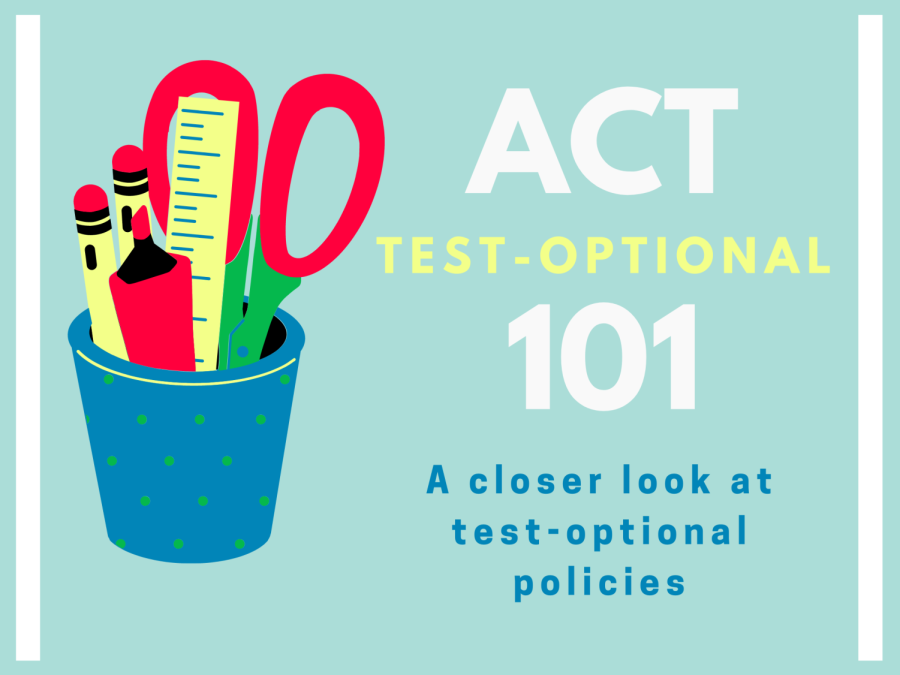Before the pandemic, students around the country participated in the test score rat race, hoping it would enhance their college application enough to get into their dream school. But that was two years ago. Students don’t seem to need a standardized test score to get into colleges today; is this true?
According to FairTest, more than 1,815 universities and colleges have gone test-optional indefinitely. These schools represent almost half of all four-year institutions in the U.S. In addition, the complete list of the institutions that are test-optional and blind for the 2022 fall application cycle includes many highly selective schools.
So what does this mean for parents, students and counselors around the country? Comprehensive Social Counselor Chris Lorenz helped modify the American College Testing (ACT) and other standardized test days during the pandemic.
“During COVID-19, students’ ability to access places to take a test was severely hindered, either because the students themselves didn’t want to go to public areas to mix with other folks to take a test or the teachers themselves weren’t offering opportunities to take the test anymore,” Lorenz said.
By the fall of their senior year, students have usually attempted the ACT at least twice. However, during April of 2020, when ACT testing usually takes place, the school did not host any tests. The lack of testing opportunities lasted through the summer, meaning some students did not have a score to submit to colleges.
“No schools were hosting tests. We had seniors that fall, who essentially had no ACT score to send to a college that had had it required, at least initially,” Lorenz said. “So that example times millions of high school kids, I think percolated through college admissions, which then started the watershed movement of going test-optional. As the applicant, they’re not going to penalize you if you don’t have an ACT score. But it might be replaced with an essay or two.”
However, since the spring of 2020, most colleges have not rescinded their test-optional policies. Junior Annie Zhang believes that the test-optional policy is beneficial for students and hopes to see it continue.
“If you’re not good at taking tests, which a lot of people aren’t, and that’s fine, [the test-optional policy ensures the score] doesn’t diminish your application and that shouldn’t diminish your application at all,” Zhang said. “I think that test-optional is better than making [ACT scores] required like it was before, because if you’re not good or you’re not fast at test-taking, then [you’re not] at a disadvantage because of that. The ACT is not a measurement of how you’re going to perform in the real world. It’s not like there’s a time limit when you’re in your job doing your task. That’s not how the real world works.”
Although there are benefits to the ACT being test-optional, students, parents and counselors are trying to look at the application from the college’s perspective. Submitting a good score could be the deciding factor for many scholarships and admissions.
“They may only have a certain number of spots to fill in, so [does the college] take the kid that sent in the ACT or go with the kid that didn’t? How does that work? I think they’re probably going to advertise that there is no advantage whether or not you send the score, and that’s all we have to go on,” Lorenz said.
The ACT is considered an objective admissions data point because the conditions, such as the time and material the students are tested on, remain the same throughout the U.S. But when colleges are replacing an ACT score expectation with essays or other substitutes, the judgment process can become more subjective.

“How do you quantify the strength of an essay? I might read an essay and give it a nine out of 10. You read the same one and give it a six out of 10. [The decision is up to] whichever person in admissions happens to read your essay on that day. It changes the game in the college admissions world,” Lorenz said. “For them, it’s super easy to say, ‘yeah, GPA of this and ACT of this, you automatically get scholarship money here, you’re going to MIT, you’re denied, or you’re waitlisted.’ I mean, it doesn’t make sense, but the [ACT scores] help them just quickly categorize students for the admissions decisions [and this may affect the students].”
Whether students decide that test-optional admissions are beneficial or not, many believe that problems with the ACT and standardized testing in general need to be addressed if colleges go back to requiring a standardized test score, including cost. But the question is if test-optional policies change this.
“There are a lot of disparities. I’m lucky that I can get a tutor, and they help to keep me accountable for all these things. But if you don’t have that money to get a tutor, you’re at a disadvantage because now everybody else has that. It’s also the same for prep books, even taking the test itself. It’s a lot. [Wealthier students can take the test] three times, but other families cannot,” Zhang said. “A lot of things [for the ACT] cost money, which just serves to worsen the disparities that we already have, because now those that can’t afford [other] things, they can’t afford [to take the ACT or to do well on the ACT].”
English Teacher Casey Holland remembers taking the ACT when he was in high school and wants everyone to know that there can be a direct relationship between a student’s ACT score and the opportunities they’re given in college.
“Nobody [helped me with my ACT] when I was in school, so I would tell families to take it seriously and take it as many times as you can. I was the first person in my family to go to college, and we just didn’t know [how it worked]. I played basketball in college, and the coach said, ‘here’s what your minimum score needs to be.’ [So] I took it, I got that score, and I never took it again. I didn’t realize that if you got a certain score, you were eligible for different scholarships, so I had to take out more student loans,” Holland said. “Take [the ACT] as many times as you can, especially with the super scoring that’s out there.”
To help students who may not have the money for a tutor, Holland teaches a free college admissions course at Maryville University during the summer. When students think about whether they should take the ACT or not, Lorenz says that it would be best if they took it because it keeps their options open.
“We want to encourage kids to continue to take the ACT because it may be to their advantage, even if [they apply to] test-optional schools. That has been our [decision] before COVID-19, that taking the ACT at least two or three times going into senior year is advisable for all kids. So that decision hasn’t changed, and that is what we will continue to say even now,” Lorenz said.
There are several factors for students to consider when looking at the college route: their ACT scores their ability to write essays— it is a different process for everyone. If you would like more advice, contact Lorenz at [email protected].




![Smiling in a sea of Longhorns, Fox 2 reporter Ty Hawkins joins junior Darren Young during the morning Oct. 3 pep rally. The last time West was featured in this segment was 2011. “[I hope people see this and think] if you come to [Parkway] West, you will have the time of your life because there are so many fun activities to do that make it feel like you belong here. I was surprised so many people attended, but it was a lot of fun,” Young said.](https://pwestpathfinder.com/wp-content/uploads/2025/10/Edited2-1200x798.jpg)
![West High seniors and families listen as a representative of The Scholarship Foundation of St. Louis, Teresa Steinkamp, leads a Free Application for Federal Student Aid (FAFSA) workshop. This session, held in the library, provided guidance on financial aid, scholarships and student loan options. “This event is very beneficial for any seniors who are applying to or considering applying to colleges after high school [because] the cost of college is on the rise for seniors and parents,” college and career counselor Chris Lorenz said.](https://pwestpathfinder.com/wp-content/uploads/2025/09/DSC_4478-1200x778.jpg)
![Senior Kamori Berry walks across the field during halftime at the Homecoming football game on Sept. 12. During the pep assembly earlier that day, she was pronounced Homecoming Queen. “I thought it was nice that the crowd [started] cheering right away. I know [my friends] were really excited for me, and my family was happy because typically non-white people don't win,” Berry said.](https://pwestpathfinder.com/wp-content/uploads/2025/09/DSC7046-Enhanced-NR-1200x798.jpg)



![Pitching the ball on Apr. 14, senior Henry Wild and his team play against Belleville East. Wild was named scholar athlete of the year by St. Louis Post-Dispatch after maintaining a high cumulative GPA and staying involved with athletics for all of high school. “It’s an amazing honor. I feel very blessed to have the opportunity to represent my school [and] what [it] stands for,” Wild said.](https://pwestpathfinder.com/wp-content/uploads/2025/05/unnamed-6-1200x714.jpg)
![The Glory of Missouri award recipients stand with their certificates after finding out which virtue they were chosen to represent. When discovering their virtues, some recipients were met with contented confirmation, while others, complete surprise. “I was not at all surprised to get Truth. I discussed that with some of the other people who were getting the awards as well, and that came up as something I might get. Being in journalism, [Fellowship of Christian Athletes and] Speech and Debate, there's a culture of really caring about truth as a principle that I've tried to contribute to as well. I was very glad; [Truth] was a great one to get,” senior Will Gonsior said.](https://pwestpathfinder.com/wp-content/uploads/2025/04/Group-Glory-of-Missouri.jpg)


Nancy Ramig • Mar 10, 2022 at 12:02 pm
Great article. Life has changed in so many ways since the pandemic – that our ‘normal’ is still being defined with each activity/opportunity that comes back to being available. Schools/companies are having to redefine their expectations and guidelines as well.